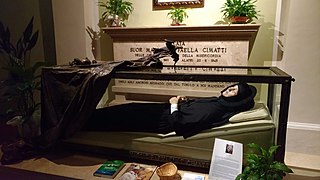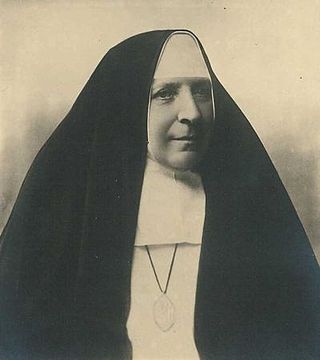
Joseph Cafasso was an Italian Catholic priest who was a significant social reformer in Turin. He was one of the so-called "Social Saints" who emerged during that particular era. He is known as the "Priest of the Gallows" due to his extensive work with those prisoners who were condemned to death. But he was also known for his excessive mortifications despite his frail constitution: he neglected certain foods and conditions to remain as frugal and basic as possible unless a doctor ordered otherwise.

Michele Rua was an Italian Catholic priest and professed member of the Salesians of Don Bosco. Rua was a student under Don Bosco and was also the latter's first collaborator in the order's founding as well as one of his closest friends. He served as the first Rector Major of the Salesians following Bosco's death in 1888. He was responsible for the expansion of the Salesians and the order had grown to a significant degree around the world at the time he died. Rua served as a noted spiritual director and leader for the Salesians known for his austerities and rigid adherence to the rule. It was for this reason that he was nicknamed "the living rule".

María Romero Meneses, FMA was a Nicaraguan Catholic religious sister and a professed member from the Salesian Sisters of Don Bosco dubbed the "Social Apostle of Costa Rica".

Teresa Grillo Michel, born as Teresa Grillo and also known by her religious name Maria Antonia, was an Italian Roman Catholic nun and the founder of the Little Sisters of Divine Providence. Grillo was a widow who also part of the Third Order of Saint Francis; she entered the religious life following the death of her husband. Grillo studied in Turin and Lodi before returning to her hometown Alessandria where she married. But her husband died sometime later leaving her in a deep depression that came a call to help the poor. Grillo founded a religious congregation that would expand into Latin America and she would also maintain contact with important individuals such as Luigi Orione and Clelia Merloni both of whom she befriended.

Eusebia Palomino Yenes was a Spanish Roman Catholic professed religious and a professed member from the Salesian Sisters of Don Bosco. Palomino worked as a domestic in her adolescence having withdrawn from her education in order to support her parents though she later worked with the Salesian Sisters before she began the process of becoming a religious of that order in the 1920s; she afterwards continued most of the same duties and became known for her devotion to the five wounds of Jesus Christ and to the Via Crucis.

Blessed Maria Pia Mastena - born Teresa Maria - was an Italian Roman Catholic professed religious and the founder of the Religious Sisters of the Holy Face. Mastena fostered a deep devotion to the Holy Face of Jesus and tried to promote that devotion to others in her religious career as a nun. Mastena first desired the contemplative life but was denied this after she entered the convent since it was not a cloister. Instead she dedicated herself to teaching in several Italian cities after having left another convent and another religious order when she deemed contemplative life was not the life she felt God wanted for her. Her labors were dedicated instead to consolidating her new religious order which began to grow after World War II until her sudden death in 1951.

Assunta Marchetti was an Italian Roman Catholic religious sister and the co-founder of the Missionary Sisters of Saint Charles Borromeo Scalabrinians; she worked in Brazil from 1895 until her death. She has been beatified as a Blessed Mother. Her priest brother Giuseppe is titled as Venerable on the path to sainthood.
Egidio Viganò was a Roman Catholic priest of the Salesians of Don Bosco, who was the 7th Rector Major of that Order from 1977 until his death in 1995. Although he was an Italian, he considered Chile as his second home country because he moved there when he was 19 years old. He was also confessor of Pope John Paul II, a prominent theologian and writer. During the first centenary of the death of Don Bosco (1988), Pope John Paul II dedicated to him the Apostolic Letter Iuvenum Patris : "To our beloved son Egidio Vigano, Rector Major of the Salesian Society on the First Centenary of the death of Saint John Bosco - John Paul II, Supreme Pontiff." He participated also in the Second Vatican Council.

Filippo Rinaldi was an Italian Roman Catholic priest and a professed member from the Salesians of Don Bosco; he served as the third Rector Major for the order from 1922 until his death in 1931. He founded the Secular Institute of Don Bosco Volunteers. Rinaldi was close friends since his childhood to Giovanni Bosco and Paolo Albera and it was Bosco who guided Rinaldi who was torn in his adolescence between the farming life and the religious life. The order held him in high esteem from the outset and noted the potential within him as well as seeing the charism of Bosco encompassed in Rinaldi.

Rosa Elena Cornejo Pazmiño, also known by her religious name María Francisca of the Wounds, was an Ecuadorian Roman Catholic religious sister. She established the Franciscan Missionaries of the Immaculata.

Caterina Dominici was an Italian Roman Catholic nun who took the name of Maria Enrichetta after she became a nun of the Sisters of Saint Anne. During the 1854 Broad Street cholera outbreak she cared for and ministered to countless people. She then went on to serve for over three decades as the Superior General of her congregation. She was also a friend and adviser to John Bosco.

Amalia Streitel was a German Roman Catholic religious sister. Streitel established the Sisters of the Sorrowful Mother and assumed the religious name Maria Franziska of the Cross.

Blessed Costanza Starace was an Italian Roman Catholic nun. She was the founder of the religious congregation known as the Compassionist Sisters Servants of Mary. Starace later assumed the new name of "Maria Maddalena of the Passion" upon the occasion of her solemn profession. She became a secular member of the Servite Order after she failed to join a religious order.

Maria Raffaella Cimatti was an Italian member of the Hospitaller Sisters of Mercy, a religious institute dedicated to medical care. She was beatified by the Catholic Church in 1996.

María Dolores Rodríguez Sopeña was a Spanish Roman Catholic nun and the founder of the Sisters of the Catechetical Institute. Her religious activism came about from her earliest experiences in Almería where she tended to the poor including a leper though she later moved to Madrid and Puerto Rico where she continued her care for the poor and the sick. Her return to her native land saw her continue her work and her commitment to establishing religious and secular movements for others all directed towards active participation and care for poor people.

Carolina Santocanale was an Italian Roman Catholic nun who assumed the name of "Maria of Jesus" and established the Capuchin Sisters of the Immaculata of Lourdes. Santocanale became well known for her treatment of the ill and the poor to whom she devoted her life and work to and was also a member of the Secular Franciscan Order.

Luigi Variara was an Italian Roman Catholic priest and a professed member of the Salesians of Don Bosco. He served for most of his life as part of the missions in Colombia where he worked with lepers and the children of outcast lepers. He was ordained as a priest while serving there and made it his mission to provide both relief and consolation.

Rafaela Porras Ayllón was a Spanish Roman Catholic professed religious who established the Handmaids of the Sacred Heart of Jesus in conjunction with her sister Dolores; upon becoming a nun she assumed the religious name of "Mary of the Sacred Heart of Jesus". She was a nun for most of her life and devoted herself to the management of the congregation and resided in Rome until her death after her resignation as the order's superior in 1893.

Margaretha Flesch, also known by her religious name Maria Rosa Flesch, was a German Roman Catholic religious sister who established the Franciscan Sisters of the Blessed Virgin Mary of the Angels. Flesch was their first Mother Superior.

Clara Fey was a German Roman Catholic Nun and the founder of the Sisters of the Poor Child Jesus. Her life was dedicated to providing aid to the poor, with particular emphasis on education, first in Aachen and later in the Netherlands.



















